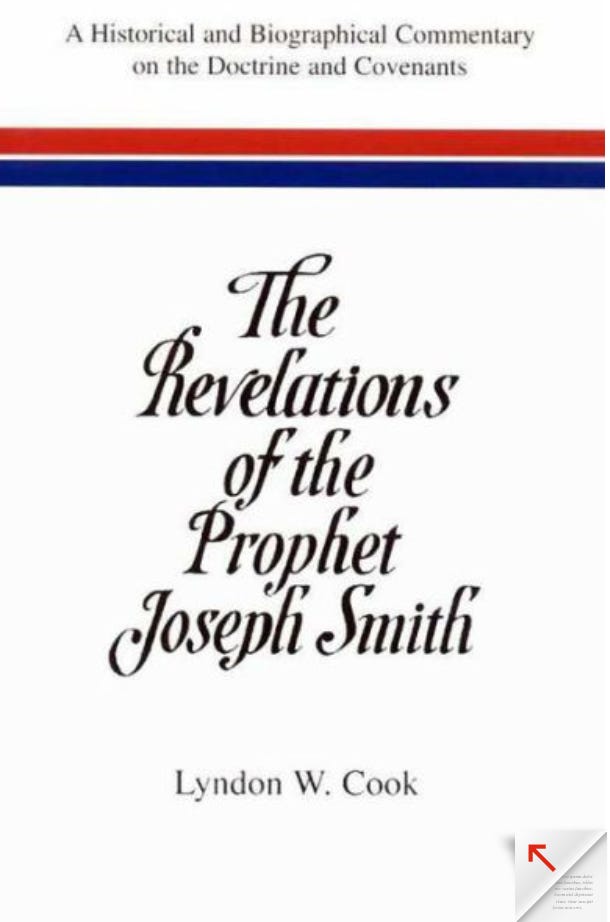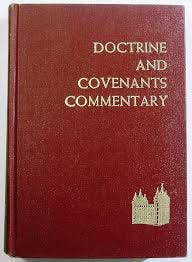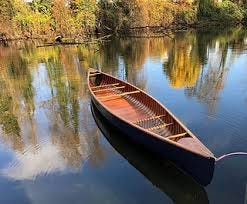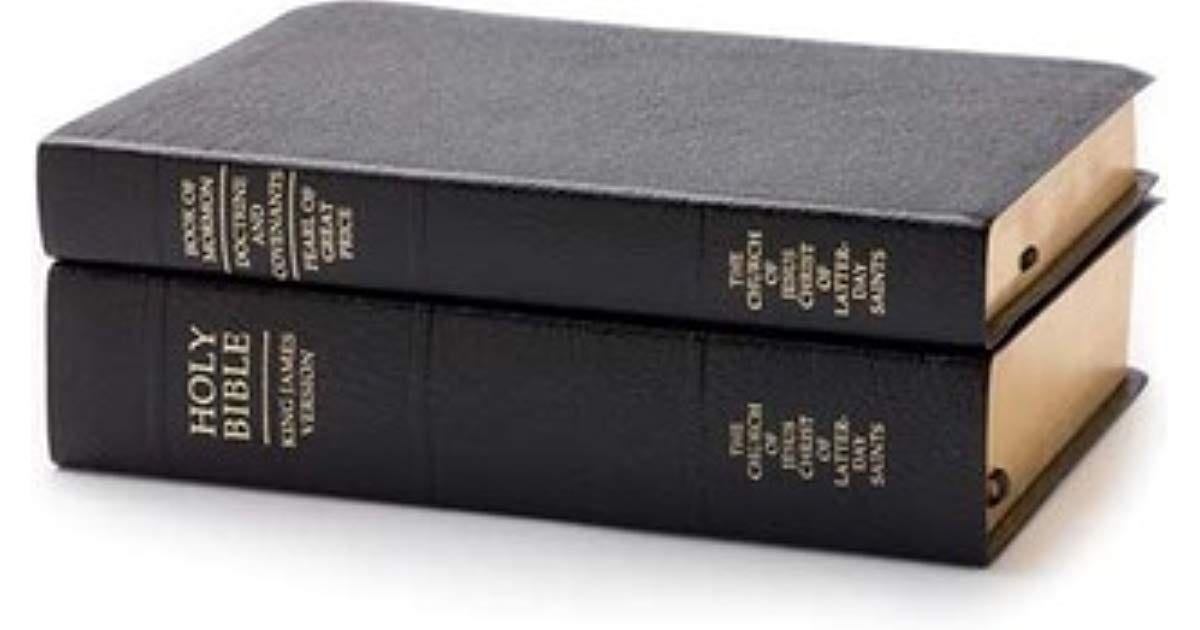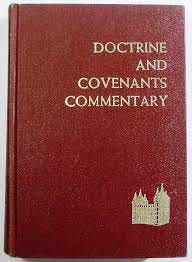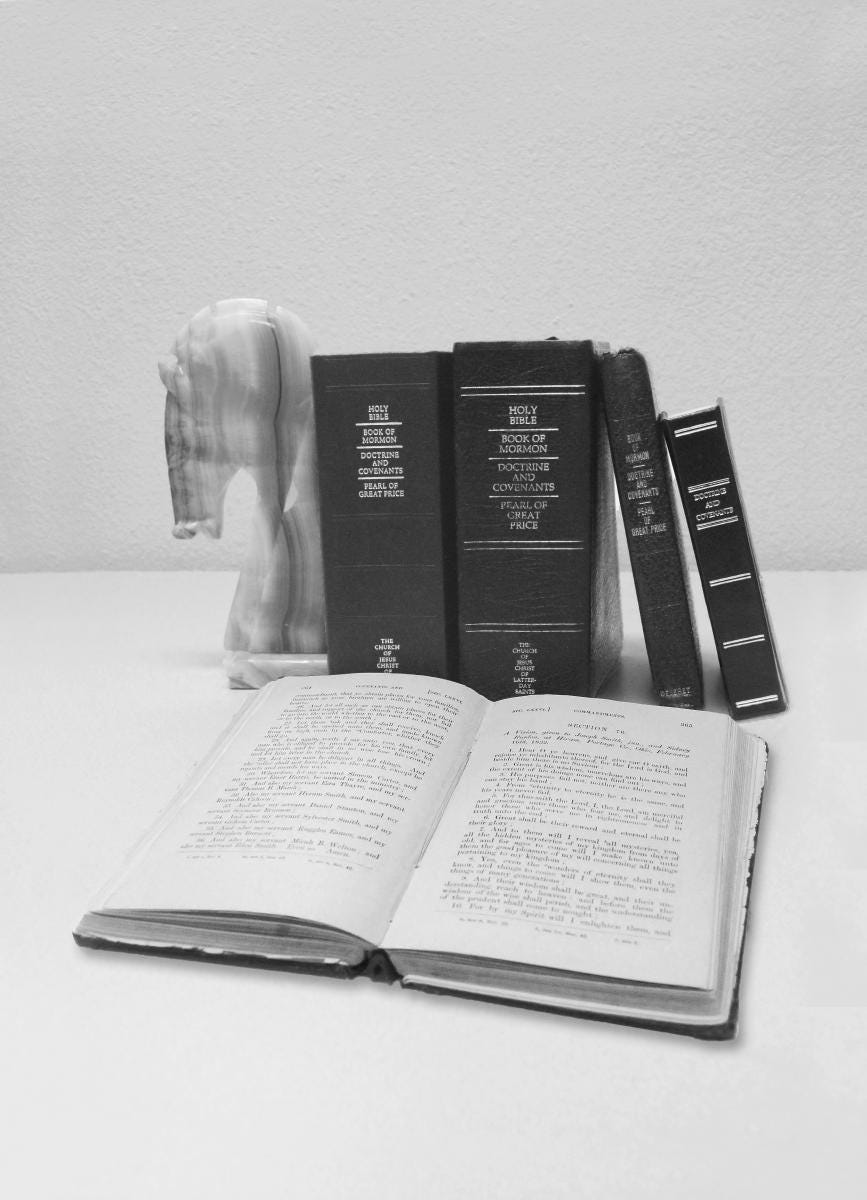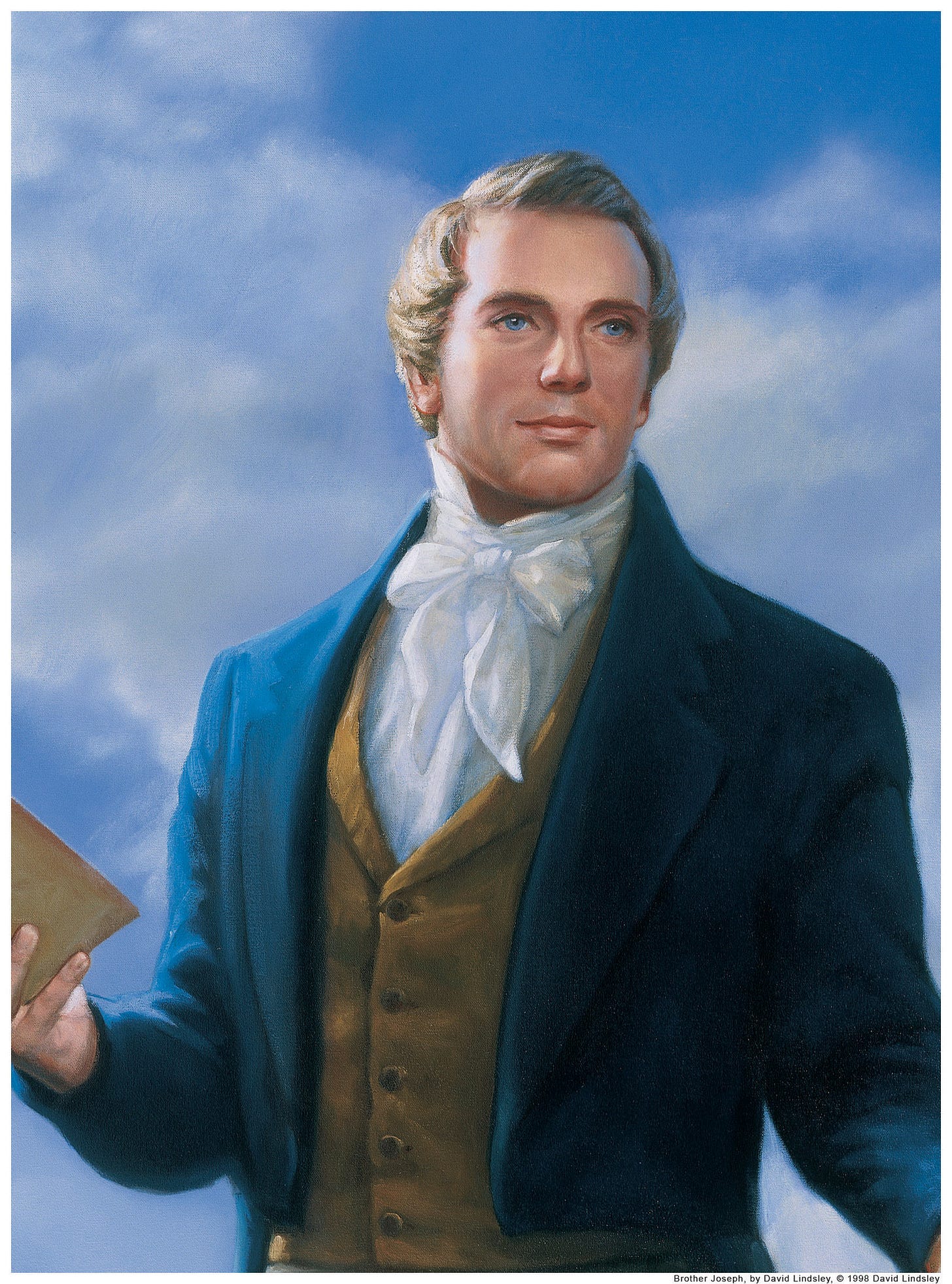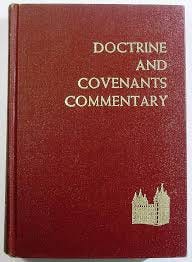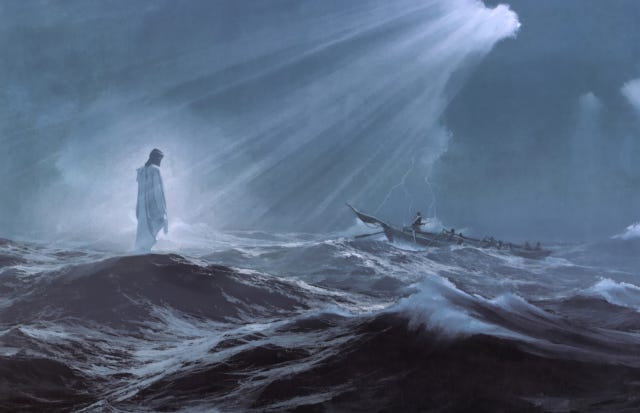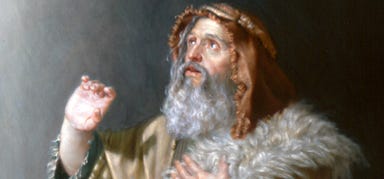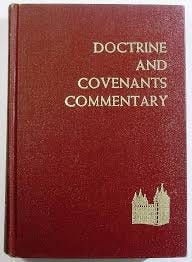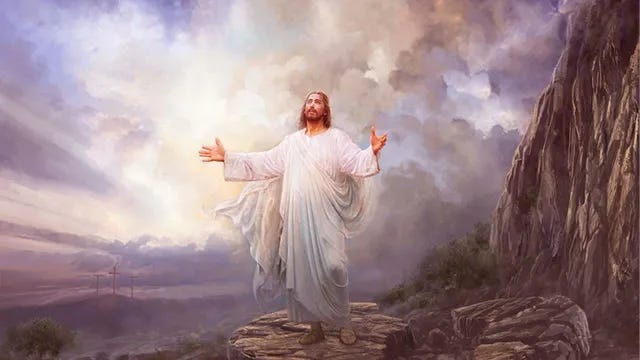No Flesh Shall Be Safe upon the Waters
Historical Background and Reflections on Doctrine and Covenants 61
This week we are studying Doctrine and Covenants 60–63 in the LDS Come Follow Me curriculum. In my previous post we studied D&C 60, and in this post we will study D&C 61. What is the historical background for D&C 61?
In his book A Joseph Smith Chronology, J. Christopher Conkling share a brief introduction to this section:
Aug. 9, 1831
Joseph leaves Independence in a canoe with ten elders. After several days of many dangers on the rivers, and after W. W. Phelps sees a daylight vision of the destroyer upon the waters, Joseph receives, on Aug. 12, D&C 61. (p. 26)
In his chapter “Ezra Booth and Isaac Morley” in Revelations in Context, Matthew McBride sheds more light on the background for this section:
The Return to Ohio
Though a few of the missionaries had been chosen to remain in Missouri, the August 1 revelation commanded the rest of the missionaries to return to their homes, indicating that “the time has not yet come for many years for them to receive their inheritance in this land.”15
Another revelation, now Doctrine and Covenants 60, instructed the returning missionaries to travel on the Missouri River east to St. Louis.16 There Joseph and Sidney Rigdon would travel speedily to Cincinnati, Ohio, to preach, while the others were to travel “two by two & preach the word not in haste among the congregations of the wicked.”17
They embarked in canoes for St. Louis on August 8. The Missouri River was notoriously difficult to navigate. Steamboat captains dreaded the sawyers, or fallen trees lurking in the river, that frequently wrecked their vessels. The elders would later tell Elizabeth Marsh that the river’s roiling current “look[ed] mad as if it had been cursed.”18
The journey was a contentious one for the elders. Exhaustion, heat, and the treacherous Missouri River frayed their nerves. On their third day on the water, some of the canoes nearly became entangled in the sawyers, which threatened to capsize the canoes, endangering the lives of those who could not swim.
After they made it safely to shore, they continued bickering. Though certainly capable of contention himself, Ezra Booth had little tolerance for it in others. He later observed sarcastically, “These are the leaders of the church, and the only church on earth the Lord beholds with approbation.”19
Joseph Smith received another revelation the following morning on the riverbank (Doctrine and Covenants 61), in which the Lord warned them of danger upon the water but said, “It mattereth not unto me … whether they go by water or by land.”20
Joseph proceeded on land the next day with a part of the group. They encountered his brother Hyrum and others who had been delayed and had yet to visit the site for Zion. A revelation (Doctrine and Covenants 62) admonished them, “Continue your Journey, assemble yourselves upon the land of Zion, & hold a meeting & rejoice together & offer a sacrament unto the most high.”21
Ezra Booth, on the other hand, decided to get back as quickly as possible rather than preach by the way according to the earlier revelation. He and a few companions traveled the remainder of the journey to Ohio by boat and coach. (pp. 133-134)
In his book The Revelations of the Prophet Joseph Smith, Lyndon W. Cook also describes the historical background for this section:
Date. 12 August 1831.
Place. McIlwaine’s Bend, Missouri River (Missouri. See Historical Note.).
Historical Note. After leaving Independence, Missouri, on 9 August 1831, the Prophet and his party traveled down the Missouri River to Fort Osage, where they spent the first night. Two days later (11 August) an accident occurred: The canoe in which the Prophet and Sidney Rigdon were riding ran into a tree lodged and bobbing in the river. The canoe was upset, and the occupants almost drowned. With this near tragedy, the party of eleven decided to land and encamp at a place called McIlwaine’s Bend, some 100 miles from Independence. The location of McIlwaine’s Bend is near present-day Miami, Saline County, Missouri (see map). Section 61, which was received the following morning (12 August), while the party still were at McIlwaine’s Bend warned of the dangers of traveling on water. The revelation instructed Joseph Smith, Sidney Rigdon, and Oliver Cowdery to leave the water route and travel by land to Cincinnati, Ohio, where they were to “open their mouths” in preaching the gospel. William W. Phelps and Sidney Gilbert, who were returning to prepare to move to Missouri, were to continue in haste, while the remainder of the elders were to preach along the way.
After receiving the revelation at McIlwaine’s Bend, Reynolds Cahoon wrote that the eleven men “then left the water [and] crosed the Misorie at Chariton.” A. Sidney Gilbert, also traveling east with the group, prefaced a copy of section 61 with the words: “A Commandment recd the 12th Augt 1831 on the Banks of the Missouri about 40 miles above Chariton on our return from Zion.” These references, seen together, assist greatly in locating McIlwaine’s Bend, and suggest that the group left the Missouri River at or near the Miami Bend (McIlwaine’s Bend], traveled several miles cross-country on the south side of the river, and then crossed the river and entered Chariton, Missouri.
Publication Note. Section 61 was first published in the Evening and Morning Star (December 1832) and was included as chapter 62 in the Book of Commandments in 1833.
In their book Doctrine and Covenants Commentary, Smith and Sjodahl introduce D&C 61 as follows:
On the 8th of August, 1831, the Lord in a Revelation (Sec. 60) directed the Prophet Joseph and his companions to return to Kirtland by way of St. Louis. The following day the Prophet, in company with ten Elders, left Independence in canoes and proceeded down the river. The journey was uneventful, until the third day, when the dangers of river-navigation became manifest. The travelers had landed at McIlwair’s, or McIlwaine’s, Bend, where they encamped on the bank of the river. While here William W. Phelps had a vision in which he say “the destroyer” riding upon the face of the waters. Some of the Elders heard a nouise, though they did not see anything.
The “destroyer” seen by William W. Phelps in a vision, was, in all probability, the Evil One himself, “the prince of the power of the air” (Eph. 2:2).
The brethren retired that evening, we may feel sure, with peculiar feelings. Their gratitude for the escape from the dangers of the river must have been mixed with misgivings and anxiety for the Saints who were preparing for emigration to the promised land. In the morning they received this Revelation, in which God (1) released them from the obligation of traveling on the river (2-3); (2) declared His decree of destruction upon the waters (4-6); (3) urged Sidney Gilbert and William W. Phelps to hasten on their journey (7-12); (4) gave a remarkable revelation concerning the waters (13-22); (5) issued special instructions to Joseph Smith, Oliver Cowdery, and Sidney Rigdon (23); (6) and the Saints (24-29); (7) gave directions concerning the preaching of the gospel (30-32); and (8) the journey of other Elders (33-35); and (9) closed with general instructions and promises (36-39). (p. 361)
This is Bruce R. McConkie’s heading for this section:
Revelation given through Joseph Smith the Prophet, on the bank of the Missouri River, McIlwaine’s Bend, August 12, 1831. On their return trip to Kirtland, the Prophet and ten elders had traveled down the Missouri River in canoes. On the third day of the journey, many dangers were experienced. Elder William W. Phelps, in a daylight vision, saw the destroyer riding in power upon the face of the waters.
This is the Prophet Joseph Smith’s introduction to what is now D&C 61:
On the 9th, in company with ten Elders, I left Independence Landing for Kirtland. We started down the river in canoes, and went the first day as far as Fort Osage, where we had an excellent wild turkey for supper. Nothing very important occurred till the third day, when many of the dangers so common upon the western waters, manifested themselves; and after we had encamped upon the bank of the river, at McIlwaine’s Bend, Brother [William W.] Phelps, in open vision by daylight, saw the destroyer in his most horrible power, ride upon the face of the waters; others heard the noise, but saw not the vision.
The next morning after prayer, I received the following: [Sec. 61, follows.] (HC 1:202-3, August 9-12, 1831, McIlwaine’s Bend, Missouri.) (In Latter-day Prophets and the Doctrine & Covenants, Vol. 1, pp. 479-80, compiled by Roy W. Doxey)
With this historical background in mind, let’s examine and appreciate D&C 61 a piece at a time:
Behold, and hearken unto the voice of him who has all power, who is from everlasting to everlasting, even Alpha and Omega, the beginning and the end.
Behold, verily thus saith the Lord unto you, O ye elders of my church, who are assembled upon this spot, whose sins are now forgiven you, for I, the Lord, forgive sins, and am merciful unto those who confess their sins with humble hearts;
But verily I say unto you, that it is not needful for this whole company of mine elders to be moving swiftly upon the waters, whilst the inhabitants on either side are perishing in unbelief. (D&C 61:1-3)
If Joseph Smith had somehow made up all of this, can you imagine the audacity of such verses? The truth is that Joseph Smith did not make up any of it. He received revelation from our Savior Jesus Christ, the only One with the power to forgive sins. As in many of the introductory verses of the D&C, our Savior reveals His titles and His attributes, including His omnipotence, eternal nature, and perfect mercy. The Lord is merciful unto those who confess their sins with humble hearts.
These verses also teach us something more about what we learned in a previous section about the great worth of souls in the sight of God. (see also here) It was certainly more efficient to travel swiftly by water, but the Lord was more concerned about the souls of those who were perishing in unbelief on either side of the river. The Lord could transport His servants, His missionaries, quickly from point A to point B, in the blink of an eye if He desired, but speed of travel was secondary to the primary purpose of His Church, namely to preach His Gospel and lead souls unto Him.
This is a principle and a lesson that could serve many branches, wards, and stakes in the Church quite well. I’ve noticed how the business mentality of the world, as well as the academic, medical, and governmental mentality of the world, have penetrated and infiltrated the Church of Jesus Christ of Latter-day Saints to such an extent that sometimes the worth of souls appears to be a secondary or ancillary concern for leaders and lay members alike.
For example, a bishop may attempt to impose his business expertise, his training in organizational behavior, and his fondness for Franklin-Covey planning and The 7 Habits of Highly Effective People upon the members of his ward as if he were organizing a new business. As another example, during the so-called COVID pandemic, we saw how medical propaganda, including the promotion of dangerous and even lethal injections, was disseminated and enforced in every corner of the Church. It’s also no secret that the upper echelons of the hierarchy of the Church are composed mainly of lawyers, doctors, businessmen, academics, and what has been called “C-Suite Saints and the Educated Elite.”
To be clear, the Lord clearly encourages education and effectiveness in His work, and there is nothing inherently wrong with speed and efficiency or with being a professional. In fact, when used in the right way and for the right reasons, all talents and abilities can bless and strengthen the Kingdom of God. But when traveling swiftly down the river from point A to point B or when passionately pursuing a desired objective blinds us to the needs of those around us, then it may be time to park our metaphorical canoes at the rivers’ edge and travel by land in order to help accomplish the Lord’s purposes in bringing to pass the immortality and eternal life of man.
Again, to be clear, there are moments when swift travel and efficiency are necessary. However, the point is that there are inhabitants on either side of the rivers of our lives who are perishing, in unbelief and in other ways, and it is not needful for a whole company of Saints or Elders of the Church to move swiftly along while ignoring the real and urgent needs of God’s children. Rather than glide His Elders swiftly from Independence to Kirtland, therefore, the Lord spread them out like a great rake or plough to comb through the regions in between in search of souls who might hear the Gospel message, repent, and be saved.
To be honest, I’m as guilty as anyone when it comes to the swift river method of living. I much prefer to go from point A to point B in as direct and efficient a manner as possible. In some ways, this is a good thing. Some of the greatest achievements of the human species have been accomplished in this way. But the longer I live the more I see why the two Great Commandments of our Lord provide the best direction for our lives. Our relationship with Heavenly Father and Jesus Christ as embodied in the First Great Commandment is primary and paramount, and like unto it are our relationships with our fellow pilgrims on planet earth, as embodied in the Second Great Commandment. Sometimes it is necessary to set aside our metaphorical swift canoes (our ambitions, our aspirations, our goals, our careers, our jobs, our hobbies, our travels, our material possessions, or whatever they may be) to better meet the needs of God’s children who are perishing on either side of the rivers of our lives. Perhaps this is something like what Peter and his fellow disciples did by straightway leaving their nets to follow our Savior Jesus Christ.
Smith’s and Sjodahl’s commentary on these introductory verses is helpful:
Released from the River.
Whose sins are now forgiven you] It appears from this that some of the Elders, in their conduct, had displeased the Lord (See verse 20). Possibly, they had refused to go any farther on the river, although their instruction was to go as far as St. Louis. Possibly, as soon as they encountered a little danger, they were seized with fear and insisted upon landing. But the vision of the destroyer seems to have had the effect of making them humble; they had sought the Lord and obtained forgiveness.
Not needful *** to be moving swiftly] The Lord released them from the obligation to travel by the more speedy river route, and permitted them to travel more slowly and preach the gospel as they went along. (p. 362)
The revelation in D&C 61 continues:
Nevertheless, I suffered it that ye might bear record; behold, there are many dangers upon the waters, and more especially hereafter;
For I, the Lord, have decreed in mine anger many destructions upon the waters; yea, and especially upon these waters.
Nevertheless, all flesh is in mine hand, and he that is faithful among you shall not perish by the waters. (D&C 61:4-6)
I was wondering why the Lord would command His servants to return to Kirtland and to purchase or make a water craft only to watch them encounter the devil along the river. The Lord explicitly states that he suffered it, or allowed it to happen, so that His servants could bear record of it, or testify of it. There was a purpose to this dangerous and frightening encounter. Part of the purpose for these experiences was for the Lord to reveal that there were, are, and will be many dangers upon the waters.
Why are there many dangers upon the waters? There are many dangers upon the waters because in His anger, the Lord decreed many destructions upon the waters, especially on the Missouri and Mississippi Rivers. Thankfully the Lord also strengthened and encouraged His servants by promising them that the faithful among them should not perish by the waters.
This reminds me of several of my own terrifying experiences upon the waters. When I was a young child I almost drowned in a lake. I remember slipping off of my raft, bobbing up and down in the water for a minute, and then beginning to sink. Thankfully, my mother was nearby and she scooped me up. On another occasion, on the Outer Banks of North Carolina, I got caught in a rip tide that pulled me away from the shore. I struggled with all my might against the current and the waves that tumbled me and pulled me under. Just when my strength was gone and I could struggle no longer, the waves spit me out again. When I reached the shore I felt stunned and awestruck by the power of the ocean.
On a trip to Havasu Falls in Arizona with my brother and my dad, we witnessed the spectacular powers of nature in full force when a flash flood crashed through the waterfall under which we had been swimming only moments before. If we had not exited the river, we would have been swept away in the flood.
On yet another occasion I joined a few friends for an excursion on the Provo River in inner-tubes. Two of my friends got out of the river almost immediately after getting in because the water was so turbulent, but another friend and I continued onward. My tube capsized and the rapids dragged me over some rocks and into the brush until I almost drowned. I was very grateful when both my friend and I safely reached the shore. I have also had many good experiences upon the waters, but these bad experiences upon the water have been enough to convince me that there are many dangers upon the waters. My paternal grandfather died upon the waters in a boat accident.
Smith and Sjodahl observe:
Destruction of the Waters.
I suffered it *** record] God commanded the Elders to travel on the river, in order that they might benefit others by bearing record of their experience.
Decreed *** destruction] Destruction had been decreed upon these rivers, and the Saints were to be warned.
Destructive tornadoes have visited the depression through which the Missouri and Mississippi rivers flow, many times. On May 7th, 1840, the city of Natchez was laid in ruins. The people were at dinner when, suddenly, the place was enveloped in darkness, the rain descended in torrents, and the strongest buildings shook as if tossed by an earthquake. Hundreds of lives were lost (Times and Seasons, Vol. I. pp. 104-5). During the year 1843, it was estimated that a number of weeks the loss of steamboats averaged one a day.
He that is faithful *** not perish] This promise has been fulfilled. Even unbelievers have had a sense of security in the company of the Saints. (pp. 362-363)
Perhaps there is a lesson in all of this. I have often wondered about the many times in my life when I have been doing my best to follow Jesus Christ and to do what is right for the right reasons, only to encounter immense trials, great turbulence, and severe afflictions. I hope that my experiences may benefit others as I too bear record.
The revelation in D&C 61 continues:
Wherefore, it is expedient that my servant Sidney Gilbert and my servant William W. Phelps be in haste upon their errand and mission.
Nevertheless, I would not suffer that ye should part until you were chastened for all your sins, that you might be one, that you might not perish in wickedness;
But now, verily I say, it behooveth me that ye should part. Wherefore let my servants Sidney Gilbert and William W. Phelps take their former company, and let them take their journey in haste that they may fill their mission, and through faith they shall overcome;
And inasmuch as they are faithful they shall be preserved, and I, the Lord, will be with them.
And let the residue take that which is needful for clothing.
Let my servant Sidney Gilbert take that which is not needful with him, as you shall agree. (D&C 61:7-12)
Do you remember Sidney Gilbert and W. W. Phelps? Because the Lord loved them, He chastened them. He chastened them to unite them and save them from perishing in wickedness. This chastening and reproof prepared them for their journey and to fill their mission. After chastening them, the Lord also showed an increase of love toward them by promising to preserve them and be with them as long as they were faithful.
Regarding these verses, Smith and Sjodahl write:
Sidney Gilbert and W. W. Phelps.
Be in haste] Sidney Gilbert had been selected to be the head of a merchant establishment in Zion, and William W. Phelps to establish a publishing house there (Sec. 57:9). They were now returning to their homes, in order to make the necessary arrangements to engage in their respective callings, and they were to make haste.
These two were directed to continue their journey on the river (vv. 9-12). The little company was, consequently, divided. They met at St. Louis, but from there they again took separate routes to Kirtland. (p. 363)
The revelation in D&C 61 continues:
And now, behold, for your good I gave unto you a commandment concerning these things; and I, the Lord, will reason with you as with men in days of old.
Behold, I, the Lord, in the beginning blessed the waters; but in the last days, by the mouth of my servant John, I cursed the waters.
Wherefore, the days will come that no flesh shall be safe upon the waters.
And it shall be said in days to come that none is able to go up to the land of Zion upon the waters, but he that is upright in heart.
And, as I, the Lord, in the beginning cursed the land, even so in the last days have I blessed it, in its time, for the use of my saints, that they may partake the fatness thereof.
And now I give unto you a commandment that what I say unto one I say unto all, that you shall forewarn your brethren concerning these waters, that they come not in journeying upon them, lest their faith fail and they are caught in snares;
I, the Lord, have decreed, and the destroyer rideth upon the face thereof, and I revoke not the decree.
I, the Lord, was angry with you yesterday, but today mine anger is turned away.
Wherefore, let those concerning whom I have spoken, that should take their journey in haste—again I say unto you, let them take their journey in haste.
And it mattereth not unto me, after a little, if it so be that they fill their mission, whether they go by water or by land; let this be as it is made known unto them according to their judgments hereafter. (D&C 61:13-22)
This doctrine is certainly unique to the Church of Jesus Christ of Latter-day Saints. Who knew that John the Beloved cursed the waters? Who knew why he cursed the waters? Only the Prophet Joseph Smith knew, by revelation.
For the good of His Saints, the Lord gave a commandment concerning the waters. It seems like the waters have been cursed for a long time (think of Noah and the flood, or Moses and the Israelites crossing the Red Sea, etc.), but apparently the Lord blessed the waters in the beginning. In the last days, however, or the days in which we now live, the Lord cursed the waters by the mouth of His servant John. These verses contain a prophesy that is still in process of fulfillment, namely that no flesh shall be safe upon the waters and that none will be able to go up to the land of Zion upon the waters except the upright in heart.
The blessings and curses have been reversed in the last days. Whereas in the beginning the Lord cursed the land, in the last days He has blessed the land for His Saints. The original place of the Garden of Eden, in Independence Missouri, will again become like the Garden of Eden. The Lord forewarned His servants and commanded them to forewarn their fellow Saints concerning the waters, specifically the Missouri and Mississippi Rivers. What was so dangerous about these waters? The destroyer rode upon them, just as W. W. Phelps had seen in vision.
Smith and Sjodahl write:
Revelation Concerning the Waters.
Behold I, the Lord, in the beginning blessed the waters] In the beginning the Spirit of God “moved upon the face of the waters,” and life and order came forth from chaos. “Darkness profound / Covered the abyss; but on the watery calm / His* brooding wings the Spirit of God outspread, / and vital virtue infused, and vital warmth, / Throughout the fluid mass.” - Milton, Paradise Lost.
In the last days *** I have cursed the waters] “By the mouth of my servant John.” In the Revelation by John, sixteenth chapter, we read that seven angels poured out vials of wrath on the Earth. The third of these was poured out upon the rivers and fountains of waters, “and they became blood” (Rev. 16:4). That this refers to convulsions in nature and sanguinary conflicts, by which persecutors and enemies of the Church will be visited before the coming of the Lord in His glory, is the opinion of most commentators.
No flesh *** safe upon the waters] This is a prophecy referring to ocean as well as river traffic. Enoch prophesied concerning the latter days, as follows:
“But before that day he saw great tribulations among the wicked; and he also saw the sea, that it was troubled, and men’s hearts failing them, looking forth with fear for the judgments of Almighty God, which should come upon the wicked” (Pearl of Great Price, Book of Moses 7:66).
Many have seen the world war that broke out in 1914 a remarkable fulfilment of these predictions concerning troubles upon the waters. The extent of the losses of ships and lives in hardly realized. On the 21st of March, 1916, it was reported from Washington that more than 2,000 merchant vessels had been sunk by U-boats and mines. Submarine warfare is something new. it dates no further back than 1885. Through the ingenuity of militarism the waters have been “cursed” by torpedoes and mines. The latter is a diabolical memento of the Russo-Japanese war, mines being for the first time extensively used at Port Arthur. The conflict in 1914, defies description for its horrors both on land and on the waters, but its successor, the conflict of 1939, far outstripped the first in the horrors of destruction both on land on on the sea.
None is able to go up to the land of Zion *** heart] Note that only those who are upright in heart have promise of protection while traveling among the dangers of the sea, to Zion.
In the beginning cursed the land] “Cursed is the ground for thy sake,” God said to Adam (Gen. 3:17). Man was to overcome the adverse forces of nature by laborious toil, and then receive for reward only a small part of the wealth hidden in the bosom of Mother Earth.
In the last days have I blessed it, in its time, for the use of my saints] While it is true that the Lord pours out his blessings upon the unjust as well as the just, “for he maketh his sun to rise on the evil and on the good, and sendeth rain on the just and on the unjust” (Matt. 5:45), yet he has in store for his Saints great blessings upon the land in its time. He has promised to give to them the fulness of the earth, and all he has asked is that we keep his commandments. “Yea, blessed are they whose feet stand upon the land of Zion, who have obeyed my gospel; for they shall receive for their reward the good things of the earth, and it shall bring forth in its strength” (Doc. and Cov. 59:3). Compare the blessings to Israel, Deut. 28.
* Milton uses the masculine pronoun, but the Hebrew noun (Ruach) is feminine, as is the participle of the verb, “moved upon” (Merakephet). The simile is that of a mother-bird bringing an egg to life by tender care. (pp. 364-365)
It’s great that Smith and Sjodahl quote from one of my favorite books of all time, Milton’s Paradise Lost. I also appreciate their interpretation of the fulfillment of these prophesies, although I consider that there is much more fulfillment of these prophesies to come, and it will become much more obvious what the Lord means by His curse upon the waters.
The revelation in D&C 61 continues:
And now, concerning my servants, Sidney Rigdon, Joseph Smith, Jun., and Oliver Cowdery, let them come not again upon the waters, save it be upon the canal, while journeying unto their homes; or in other words they shall not come upon the waters to journey, save upon the canal. (D&C 61:23)
What a relief, especially after almost capsizing and after W. W. Phelps saw the destroyer upon the waters. I would not want to travel by water after those experiences either.
Smith and Sjodahl note:
Sidney Rigdon, Joseph Smith, and Oliver Cowdery
The canal] There were several canals. Some took the travelers around the rapids in the large rivers; others connected navigable rivers. The instruction not to journey on the river did not include such artificial waterways. (p. 366)
Behold, I, the Lord, have appointed a way for the journeying of my saints; and behold, this is the way—that after they leave the canal they shall journey by land, inasmuch as they are commanded to journey and go up unto the land of Zion;
And they shall do like unto the children of Israel, pitching their tents by the way.
And, behold, this commandment you shall give unto all your brethren.
Nevertheless, unto whom is given power to command the waters, unto him it is given by the Spirit to know all his ways;
Wherefore, let him do as the Spirit of the living God commandeth him, whether upon the land or upon the waters, as it remaineth with me to do hereafter.
And unto you is given the course for the saints, or the way for the saints of the camp of the Lord, to journey. (D&C 61:24-29)
This was a real migration. This migration followed the pattern of Moses and the Children of Israel who left Egypt for the Promised Land. The early Saints were like the children of Israel. If we extend this analogy a little further, this means that many of us modern Latter-day Saints may be somewhat like the Jews who inhabited the Holy Land during the Meridian of Time. We modern Saints often talk about our heritage in a way that reminds me of the New Testament Jews who revered Moses and Abraham but failed to recognize and accept Jesus Christ when He arrived. Whatever the case, there will be another and final migration to Zion that will follow a similar pattern.
The Lord gave power to some of His servants to command the waters. This is very much in the pattern of Moses who split the Red Sea, healed the waters of Marah, and caused water to gush forth from the rock of Horeb:
And calling upon the name of God, he beheld his glory again, for it was upon him; and he heard a voice, saying: Blessed art thou, Moses, for I, the Almighty, have chosen thee, and thou shalt be made stronger than many waters; for they shall obey thy command as if thou wert God.
And lo, I am with thee, even unto the end of thy days; for thou shalt deliver my people from bondage, even Israel my chosen. (Moses 1:25-26)
It is remarkable that the Lord gives power unto some of His servants to command the waters, and that unto such it is also given another gift. My interpretation of these verses is that unto whomsoever the Lord gives power over the waters, like Moses, the Lord also gives power over the adversary. In connection with this, also consider Nephi’s brother Jacob’s testimony:
Wherefore, we search the prophets, and we have many revelations and the spirit of prophecy; and having all these witnesses we obtain a hope, and our faith becometh unshaken, insomuch that we truly can command in the name of Jesus and the very trees obey us, or the mountains, or the waves of the sea.
Nevertheless, the Lord God showeth us our weakness that we may know that it is by his grace, and his great condescensions unto the children of men, that we have power to do these things. (Jacob 4:6-7)
Thus the Lord commanded Joseph Smith (in my interpretation of these verses in the Doctrine and Covenants) to be like unto Moses, to lead the modern children of Israel, with power over the waters and power over the adversary.
Instructions for Immigrating Saints.
They shall journey by land] God can protect His people on the water as well as on land, but He does save them miraculously from the dangers they can avoid by using common precautions.
The Mississippi river is navigable at a distance of 2,500 miles. As late as 1866 there were seventy-one steamers plying on the part of the river that flows through the State of Missouri alone. Twenty years later this number had dwindled to ten, three of which were tow boats. It is very remarkable that the Prophet, as far back as 1831, was led to anticipate the cessation of passenger traffic on this mighty water-way, by establishing a land route for the Saints.
Pitching their tents by the way] By traveling on land and camping together at night, the Saints had the advantage of common devotional exercises every day.
-
-
-
The course for the Saints] It was one of the duties of the Prophet Joseph to map out the course which the Lord’s camp should follow on its way to the promised land. The Saints were to be led by the Spirit of revelation. (pp. 366-367)
The revelation in D&C 61 continues:
And again, verily I say unto you, my servants, Sidney Rigdon, Joseph Smith, Jun., and Oliver Cowdery, shall not open their mouths in the congregations of the wicked until they arrive at Cincinnati;
And in that place they shall lift up their voices unto God against that people, yea, unto him whose anger is kindled against their wickedness, a people who are well-nigh ripened for destruction.
And from thence let them journey for the congregations of their brethren, for their labors even now are wanted more abundantly among them than among the congregations of the wicked. (D&C 61:30-32)
If the people of Cincinnati were so wicked that they were ripened for destruction in in 1831, how ripe are they, and we today? I shudder to think just how ripe for destruction we are today. The Lord commanded His servants in what was basically the First Presidency at that time to rebuke the wicked citizens of Cincinnati and call them unto repentance, but then to return to their congregations where they were most needed.
Smith and Sjodahl observe:
Instructions Concerning Preaching the Gospel.
Sidney Rigdon, Joseph Smith, and Oliver Cowdery were not to bear their testimony, until they came to Cincinnati, Ohio. The people of that city had been warned, but they were to be called to repentance again.
The revelation in D&C 61 continues:
And now, concerning the residue, let them journey and declare the word among the congregations of the wicked, inasmuch as it is given;
And inasmuch as they do this they shall rid their garments, and they shall be spotless before me.
And let them journey together, or two by two, as seemeth them good, only let my servant Reynolds Cahoon, and my servant Samuel H. Smith, with whom I am well pleased, be not separated until they return to their homes, and this for a wise purpose in me. (D&C 61:33-35)
It is the responsibility of the Lord’s servants to declare His word, even among the wicked, to rid their garments of their blood and to become spotless before the Lord. This also reminds me of Jacob’s (Nephi’s brother’s) declaration:
O, my beloved brethren, remember my words. Behold, I take off my garments, and I shake them before you; I pray the God of my salvation that he view me with his all-searching eye; wherefore, ye shall know at the last day, when all men shall be judged of their works, that the God of Israel did witness that I shook your iniquities from my soul, and that I stand with brightness before him, and am rid of your blood. (2 Nephi 9:44)
And of King Benjamin’s declaration:
I say unto you that I have caused that ye should assemble yourselves together that I might rid my garments of your blood, at this period of time when I am about to go down to my grave, that I might go down in peace, and my immortal spirit may join the choirs above in singing the praises of a just God. (Mosiah 2:28)
The Lord’s wise purposes for His servants with whom He was well pleased, namely Reynolds Cahoon and Samuel H. Smith, may have included their protection by traveling together and not being separated until they returned to their homes. This is one feature of missionary work, traveling or two by two, that continues in our day.
This is Smith’s and Sjodahl’s commentary on these verses:
Concerning Other Elders.
Declare the word *** as it is given] There were eleven Elders in the company. Special instructions had been given to Joseph Smith, Oliver Cowdery, Sidney Gilbert, William W. Phelps, and Sidney Rigdon. The other six were to travel, either all together or two and two, and preach the gospel.
Rid their garments] See Sec. 60:15.
Two by two] Our Lord sent His disciples out in pairs. It is not good for men to be alone; nor to travel alone. In congenial companionship there is a spiritual strength. It is, moreover, desirable that baptisms and other ordinances be performed in the presence of witnesses. For these reasons the Lord sends His messengers forth in pairs or companies. Reynolds Cahoon and Samuel H. Smith, however, were to travel together (Compare Section 52:30). Elders traveling two by two became a protection to each other against false accusers.
Reynolds Cahoon held many important positions in the Church. In 1833 he was associated with Hyrum Smith and Jared Carter in a committee appointed to raise money for a house of the Lord in Kirtland, in which to accommodate the Elders who might come there to receive instructions before engaging in missionary work. In 1839 he was appointed second counselor to John Smith, who, at that time, presided over the Saints in Iowa. In 1840 he was a member of a committee appointed to superintend the building of the Nauvoo Temple.
Samuel H. Smith] See Sec. 23:4. (pp. 367-368)
The revelation in D&C 61 continues and concludes:
And now, verily I say unto you, and what I say unto one I say unto all, be of good cheer, little children; for I am in your midst, and I have not forsaken you;
And inasmuch as you have humbled yourselves before me, the blessings of the kingdom are yours.
Gird up your loins and be watchful and be sober, looking forth for the coming of the Son of Man, for he cometh in an hour you think not.
Pray always that you enter not into temptation, that you may abide the day of his coming, whether in life or in death. Even so. Amen. (D&C 61:36-39)
I am grateful for this encouragement and counsel from the Lord.
Smith and Sjodahl observe:
General Instructions and Promises
I am in your midst] The Lord was with the Saints in their journeys, their struggles, their triumphs, or short-comings, as really as He was with the children of Israel in the wilderness. There is no other ground on which to account for the marvelous progress of the Church in the face of the enmity of man.
The blessings of the kingdom are yours] The blessings and privileges of citizenship in the kingdom of Heaven.
General Notes
The prophecy in this Section furnishes a good illustration of double application of the prophetic work. There are many such “double” prophecies in the Scriptures. To that class belong the promises to Abraham (Gen. 15), the predictions of Jacob concerning Judah and the sons of Joseph (Gen. 49); of Balaam (Numb. 24:17); of Nathan (II Sam. 7:12-17); our Lord’s prediction concerning the destruction of Jerusalem, and prophecies concerning the restoration of Israel. In this Section the Elders are shown the destroyer making the great rivers of North America unsafe for navigation, and at the same time the vision is opened up and they are made aware of the general application of the “curse” in the latter days.
God’s educational methods are wonderful. He commanded the Elders to go by the river to St. Louis. They complied with this command until, in the third day of their voyage, they met with an experience which caused them to land. The destroyer then appeared, and that vision was followed by the Revelation concerning destruction upon the waters. And thus the lesson was impressed on their minds.
Our Lord says He has blessed the land for the use of the Saints. These paragraphs from a sermon by Elder George A. Smith are to the point:
“We came to this land [Utah] because it was so desert, desolate and God-forsaken that no mortal upon Earth ever would covet it; but, as Colonel Fremont reported, that at the mouth of the Bear River, in the early part of August, his thermometer stood at 29 degrees Fahrenheit, three degrees below the freezing-point, which would kill grain, fruit, or vegetables, our enemies said, ‘You Mormons may go there and welcome,’ chuckling to each other over what seemed to them our annihilation. *** The newspapers recorded the joy, and gratification felt at the utter under of ‘Mormonism.’ *** Notwithstanding, however, the many drawbacks and difficulties encountered in the shape of drought, crickets, grasshoppers, and the cold, sterile climate, the Spirit of the Lord was hovering over the Great Basin *** and the climate became genial and soft” (Jour. of Dis., Vol. XI., p. 177). (pp. 368-369)
The Prophet Joseph Smith made an interesting remark about these verses as well:
Jesus Christ never did reveal to any man the precise time that He would come. [Sec. 130:14-17.] Go and read the scriptures, and you cannot find anything that specifies the exact hour He would come; and all that say so are false teachers. (HC 6:254, 1844.) (See Doxey, Latter-day Prophets and the Doctrine and Covenants, Vol. 1, p. 485)
Compare and contrast the above statement with an earlier statement by the Prophet Joseph Smith:
"Christ says, 'No man knoweth the day or the hour when the Son of Man cometh.' . . . Did Christ speak this as a general principle throughout all generations? Oh no; he spoke in the present tense. No man that was then living upon the footstool of God knew the day or the hour. But he did not say that there was no man throughout all generations that should know the day or the hour. No, for this would be in flat contradiction with other scripture, for the prophet says that God will do nothing but what he will reveal unto his servants the prophets [ Amos 3:7]. Consequently, if it is not made known to the prophets it will not come to pass."







